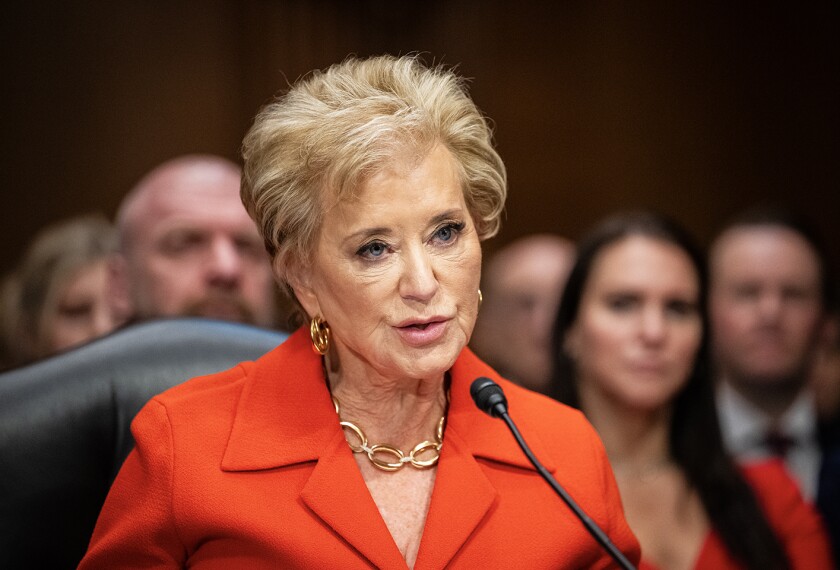The federal government plans to pay for states to work together to create English-language-proficiency tests for the Common Core State Standards Initiative, according to a notice for proposed grant priorities published in the Federal Register on Friday.
The plan calls for a minimum of 15 states to join together in each consortium that applies to create an English-proficiency test, prompting some observers to speculate that federal officials favor the idea of having a very limited number of such tests, if not one national test.
“It’s going to start looking like a single national assessment for English-language proficiency, which it should,” said Robert Linquanti, a senior research associate for WestEd, a San Francisco-based education research firm. “To the extent we have common standards and a common definition for [English-language learners], it’s only going to help.”
Currently, states can choose from a wide variety of English-proficiency tests that were developed by state consortia or commercial publishers for accountability purposes under the federal No Child Left Behind Act. States such as California, New York, and Texas even developed their own individual English-proficiency tests.
The U.S. Department of Education said in the Jan. 7 notice that it plans to add the development of English-proficiency tests based on the common-core standards as a priority to an existing competitive-grant program called the Enhanced Assessment Instruments Grant program. The notice proposes that members of any consortium getting a grant must agree to a common definition of ELLs and common criteria for such students to move out of that status.
The federal government has since 2008 strongly encouraged states to standardize their definitions for ELLs and criteria for such students to exit special programs within states, but it’s new for federal officials to push for such uniformity among states.
Grants for the English-proficiency tests based on the common-core standards would likely total about $10.3 million, Carlos Martinez, the group leader for standards and assessments for the Education Department, said in a phone interview. He said the department hopes to roll out the new grants, using funds from fiscal year 2010 to be spent in fiscal 2011, by the end of August. The deadline for comment on the notice is Feb. 7.
An Afterthought?
Experts in the education of English-language learners praised the federal government for its plans to finance an important piece of the implementation of common-core standards, but also said it is unfortunate that the focus on ELLs seems to be separate from other efforts to implement the standards.
“I guess we are once again in a situation where the train has left the station, and here we are again (now with 5-plus million students) watching it leave and trying to jump on,” wrote Kenji Hakuta, an education professor at Stanford University, in an e-mail message to Education Week.
When asked whether the federal government was trying to float the idea in the notice that the nation should have a limited number of English-proficiency tests, if not only one, Mr. Martinez stressed that the notice is “not a policy statement in any way.”
Elizabeth Grant, a special assistant in the Education Department’s office of elementary and secondary education, added, “We want to encourage states to work together.”
Mr. Martinez said that for research purposes, it’s important that states cooperating to create the new English-proficiency tests use the same definition and exit criteria for ELLs so researchers can better judge if the resulting tests are high-quality. “We need to make sure the same students are in this group and they don’t bounce in and out, because there may be differences in state definitions for who is eligible [for ELL status],” he said.
The new English-proficiency tests are meant to complement the academic assessments for common-core standards now being created by two consortia with federal Race to the Top assessment grants.
Some states formed consortia to create the English-proficiency tests that are now used in states. The largest consortium is the World-Class Instructional Design and Assessment, or WIDA, consortium, which has 24 members that have adopted the same English-proficiency test. The Council of Chief State School Officers, which helped lead the initiative to develop the common-core academic standards, has also managed a consortium of states to create an English-proficiency test.
Timothy Boals, the executive director of WIDA, declined to comment on the specifics of the federal notice because he said his organization aims to apply for a grant in the proposed competition.
He said WIDA has already started to improve the alignment of its English-proficiency assessment with common-core standards.
Mr. Boals added that states in the WIDA consortium use the same English-proficiency scale and standards but currently have their own definitions for ELLs and exit criteria.
Mr. Linquanti warned that some states with local-control laws that permit school districts to set their own criteria for when English-learners should exit programs may resist giving up flexibility.




